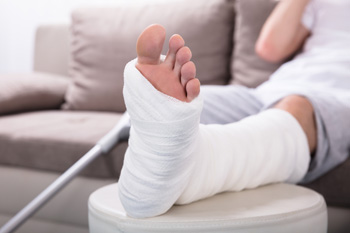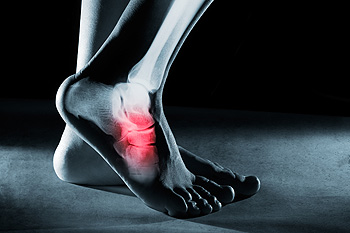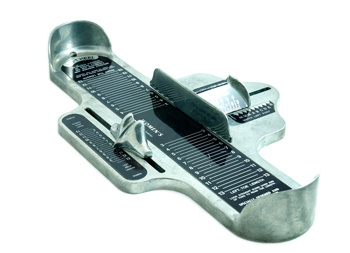March 2021
What Caused My Hammertoe?
 When the ligaments and tendons in the middle joint of toes slowly tighten up over time, the toes become forced to curl downwards. This results in what is known as hammertoe. Hammertoe can develop in any toe except the big toe. The joints will become stiffer over time and thus, harder to move without pain. Blisters and calluses may also begin to form on the toes. One of the most common causes of hammertoe is shoes that have narrow toe boxes, such as pointed toe high heels. Hammertoes can also be a result of a stubbed toe or toe fracture. Patients who are struggling with a painful hammertoe should consult with a podiatrist in order to get relief and treatment options.
When the ligaments and tendons in the middle joint of toes slowly tighten up over time, the toes become forced to curl downwards. This results in what is known as hammertoe. Hammertoe can develop in any toe except the big toe. The joints will become stiffer over time and thus, harder to move without pain. Blisters and calluses may also begin to form on the toes. One of the most common causes of hammertoe is shoes that have narrow toe boxes, such as pointed toe high heels. Hammertoes can also be a result of a stubbed toe or toe fracture. Patients who are struggling with a painful hammertoe should consult with a podiatrist in order to get relief and treatment options.
Hammertoe
Hammertoes can be a painful condition to live with. For more information, contact the podiatrists from New England Family Foot Care. Our doctors will answer any of your foot- and ankle-related questions.
Hammertoe is a foot deformity that affects the joints of the second, third, fourth, or fifth toes of your feet. It is a painful foot condition in which these toes curl and arch up, which can often lead to pain when wearing footwear.
Symptoms
- Pain in the affected toes
- Development of corns or calluses due to friction
- Inflammation
- Redness
- Contracture of the toes
Causes
Genetics – People who are genetically predisposed to hammertoe are often more susceptible
Arthritis – Because arthritis affects the joints in your toes, further deformities stemming from arthritis can occur
Trauma – Direct trauma to the toes could potentially lead to hammertoe
Ill-fitting shoes – Undue pressure on the front of the toes from ill-fitting shoes can potentially lead to the development of hammertoe
Treatment
Orthotics – Custom made inserts can be used to help relieve pressure placed on the toes and therefore relieve some of the pain associated with it
Medications – Oral medications such as anti-inflammatories or NSAIDs could be used to treat the pain and inflammation hammertoes causes. Injections of corticosteroids are also sometimes used
Surgery – In more severe cases where the hammertoes have become more rigid, foot surgery is a potential option
If you have any questions please contact our office located in Milton, MA . We offer the newest diagnostic and treatment technologies for all your foot and ankle needs.
How Podiatrists Treat Broken Ankles
 The ankle is the joint where the tibia (shin bone), the fibia (back bone on the lower leg), and the tallus (which connects to the heel bone) all come together. A broken bone in this area can range from a hairline fracture to a shattering of the bone, and the symptoms may vary depending on the type of break. Common symptoms are pain, swelling, and the inability to put weight on the ankle. Because broken ankles are very serious and can be easily mistaken for an ankle sprain, patients who are experiencing severe ankle pain should visit a podiatrist. A podiatrist will examine the ankle and use diagnostic imaging to determine what bones may be out of place. Severe fractures will usually require a cast or brace in order to allow the ankle to heel. However, some severe breaks with bones out of alignment will require surgery. After the initial treatment, your podiatrist will be able to guide you in your recovery.
The ankle is the joint where the tibia (shin bone), the fibia (back bone on the lower leg), and the tallus (which connects to the heel bone) all come together. A broken bone in this area can range from a hairline fracture to a shattering of the bone, and the symptoms may vary depending on the type of break. Common symptoms are pain, swelling, and the inability to put weight on the ankle. Because broken ankles are very serious and can be easily mistaken for an ankle sprain, patients who are experiencing severe ankle pain should visit a podiatrist. A podiatrist will examine the ankle and use diagnostic imaging to determine what bones may be out of place. Severe fractures will usually require a cast or brace in order to allow the ankle to heel. However, some severe breaks with bones out of alignment will require surgery. After the initial treatment, your podiatrist will be able to guide you in your recovery.
Broken ankles need immediate treatment. If you are seeking treatment, contact the podiatrists from New England Family Foot Care. Our doctors can provide the care you need to keep you pain-free and on your feet.
Broken Ankles
A broken ankle is experienced when a person fractures their tibia or fibula in the lower leg and ankle area. Both of these bones are attached at the bottom of the leg and combine to form what we know to be our ankle.
When a physician is referring to a break of the ankle, he or she is usually referring to a break in the area where the tibia and fibula are joined to create our ankle joint. Ankles are more prone to fractures because the ankle is an area that suffers a lot of pressure and stress. There are some obvious signs when a person experiences a fractured ankle, and the following symptoms may be present.
Symptoms of a Fractured Ankle
- Excessive pain when the area is touched or when any pressure is placed on the ankle
- Swelling around the area
- Bruising of the area
- Area appears to be deformed
If you suspect an ankle fracture, it is recommended to seek treatment as soon as possible. The sooner you have your podiatrist diagnose the fracture, the quicker you’ll be on the way towards recovery.
If you have any questions, please feel free to contact our office located in Milton, MA . We offer the newest diagnostic and treatment technologies for all your foot care needs.
Wounds That Don't Heal Need to Be Checked
Different Causes of Foot Pain
 Our feet undergo a lot of use over our lifetime, and as a result, a variety of painful issues can develop. Bunions, which causes the big toe to turn towards the other toes, can lead to a lot of pain while walking. Plantar fasciitis, which is the inflammation of the tendon that runs along the bottom of the foot, can often lead to heel pain and pain in the arch of the foot. Another common source of heel pain is heel spurs. These occur as bony bumps in the heel that are calcium deposits. Other issues, like gout, can lead to a burning sensation in the foot. Gout is caused by an excess of uric acid in the body that builds up in the joints. Some issues can lead to numbness in the foot, and this numbness usually indicates Morton’s neuroma which is the thickening of the nerve around the ball of the foot. If you are struggling with pain in your feet, consulting with a podiatrist is recommended. A podiatrist will be able to help find the source and a proper treatment method.
Our feet undergo a lot of use over our lifetime, and as a result, a variety of painful issues can develop. Bunions, which causes the big toe to turn towards the other toes, can lead to a lot of pain while walking. Plantar fasciitis, which is the inflammation of the tendon that runs along the bottom of the foot, can often lead to heel pain and pain in the arch of the foot. Another common source of heel pain is heel spurs. These occur as bony bumps in the heel that are calcium deposits. Other issues, like gout, can lead to a burning sensation in the foot. Gout is caused by an excess of uric acid in the body that builds up in the joints. Some issues can lead to numbness in the foot, and this numbness usually indicates Morton’s neuroma which is the thickening of the nerve around the ball of the foot. If you are struggling with pain in your feet, consulting with a podiatrist is recommended. A podiatrist will be able to help find the source and a proper treatment method.
Foot Pain
Foot pain can be extremely painful and debilitating. If you have a foot pain, consult with the podiatrists from New England Family Foot Care. Our doctors will assess your condition and provide you with quality foot and ankle treatment.
Causes
Foot pain is a very broad condition that could be caused by one or more ailments. The most common include:
- Bunions
- Hammertoes
- Plantar Fasciitis
- Bone Spurs
- Corns
- Tarsal Tunnel Syndrome
- Ingrown Toenails
- Arthritis (such as Gout, Rheumatoid, and Osteoarthritis)
- Flat Feet
- Injury (from stress fractures, broken toe, foot, ankle, Achilles tendon ruptures, and sprains)
- And more
Diagnosis
To figure out the cause of foot pain, podiatrists utilize several different methods. This can range from simple visual inspections and sensation tests to X-rays and MRI scans. Prior medical history, family medical history, and any recent physical traumatic events will all be taken into consideration for a proper diagnosis.
Treatment
Treatment depends upon the cause of the foot pain. Whether it is resting, staying off the foot, or having surgery; podiatrists have a number of treatment options available for foot pain.
If you have any questions, please feel free to contact our office located in Milton, MA . We offer the newest diagnostic and treatment technologies for all your foot care needs.
Treating Plantar Fasciitis
 Plantar fasciitis is a condition in which the plantar fascia, a ligament that runs along the bottom of the foot, becomes injured, inflamed, and painful. Plantar fasciitis has a variety of causes, including spending too much time on your feet, engaging in high-impact repetitive activities like running, and wearing improper shoes that do not adequately support the foot. Plantar fasciitis can be treated conservatively by taking nonsteroidal anti-inflammatory medications to manage pain, stretching the feet each day, resting the feet regularly, massaging the feet, and wearing comfortable, supportive shoes. If you have plantar fasciitis, it is recommended that you see a podiatrist for treatment.
Plantar fasciitis is a condition in which the plantar fascia, a ligament that runs along the bottom of the foot, becomes injured, inflamed, and painful. Plantar fasciitis has a variety of causes, including spending too much time on your feet, engaging in high-impact repetitive activities like running, and wearing improper shoes that do not adequately support the foot. Plantar fasciitis can be treated conservatively by taking nonsteroidal anti-inflammatory medications to manage pain, stretching the feet each day, resting the feet regularly, massaging the feet, and wearing comfortable, supportive shoes. If you have plantar fasciitis, it is recommended that you see a podiatrist for treatment.
Plantar fasciitis can be very painful and inconvenient. If you are experiencing heel pain or symptoms of plantar fasciitis, contact the podiatrists from New England Family Foot Care. Our doctors can provide the care you need to keep you pain-free and on your feet.
What Is Plantar Fasciitis?
Plantar fasciitis is the inflammation of the thick band of tissue that runs along the bottom of your foot, known as the plantar fascia, and causes mild to severe heel pain.
What Causes Plantar Fasciitis?
- Excessive running
- Non-supportive shoes
- Overpronation
- Repeated stretching and tearing of the plantar fascia
How Can It Be Treated?
- Conservative measures – anti-inflammatories, ice packs, stretching exercises, physical therapy, orthotic devices
- Shockwave therapy – sound waves are sent to the affected area to facilitate healing and are usually used for chronic cases of plantar fasciitis
- Surgery – usually only used as a last resort when all else fails. The plantar fascia can be surgically detached from the heel
While very treatable, plantar fasciitis is definitely not something that should be ignored. Especially in severe cases, speaking to your doctor right away is highly recommended to avoid complications and severe heel pain. Your podiatrist can work with you to provide the appropriate treatment options tailored to your condition.
If you have any questions please feel free to contact our office located in Milton, MA . We offer the newest diagnostic and treatment technologies for all your foot and ankle needs.
Tips for Finding the Right Shoes
 As our bodies age, our feet can take quite a bit of wear and tear. Because of this, making sure your shoes fit properly is very important, and there are a variety of tips that can help make sure your shoes fit correctly. It is very important to always have your feet measured before buying shoes, and since our feet are largest in the afternoon, that is when measuring the feet is recommended. Since many people have one foot that is bigger than the other, make sure the shoe fits the larger foot the most comfortably. When trying on shoes, there should be approximately 3/8ths to half an inch of room between the longest toe and the end of the shoe while standing up. Shoes should not feel too tight when trying them on, and the heel should not be slipping while walking. Lastly, don’t be afraid to walk around in the shoes to make sure they have the right fit. If you would like more information on making sure your shoes fit properly, please consult with a podiatrist.
As our bodies age, our feet can take quite a bit of wear and tear. Because of this, making sure your shoes fit properly is very important, and there are a variety of tips that can help make sure your shoes fit correctly. It is very important to always have your feet measured before buying shoes, and since our feet are largest in the afternoon, that is when measuring the feet is recommended. Since many people have one foot that is bigger than the other, make sure the shoe fits the larger foot the most comfortably. When trying on shoes, there should be approximately 3/8ths to half an inch of room between the longest toe and the end of the shoe while standing up. Shoes should not feel too tight when trying them on, and the heel should not be slipping while walking. Lastly, don’t be afraid to walk around in the shoes to make sure they have the right fit. If you would like more information on making sure your shoes fit properly, please consult with a podiatrist.
Finding a properly-fitting shoe is important in reducing injuries and preventing foot problems. For more information about treatment, contact the podiatrists from New England Family Foot Care. Our doctors will treat your foot and ankle needs.
Proper Shoe Fitting
A common concern when it comes to foot health, having properly fitted shoes can help prevent injuries to the foot. Out feet affect our posture and gait, which in turn affects the biomechanics and overall bodily structure. With 33 joints, 26 bones, and over 100 ligaments, the potential for serious injury is much greater than one realizes. Although the feet cease growth in adulthood, they still change shape as they mature. Here are some factors to consider when it comes to investing in proper fitting shoes:
- Be sure the shoes fit correctly right away
- Ensure the ball of your foot fits comfortably in the widest portion of the shoes
- Even though they may look fashionable, improper fitting shoes can either create adverse conditions or exacerbate existing ones you may already have
- Walk along a carpeted surface to ensure the shoes comfortably fit during normal activity
Keeping in mind how shoes fit the biomechanics of your body, properly-fitting shoes are vitally important. Fortunately, it is not difficult to acquire footwear that fits correctly. Be sure to wear shoes that support the overall structure of your body. Do your feet a favor and invest in several pairs of well-fitted shoes today.
If you have any questions please feel free to contact our office located in Milton, MA . We offer the newest diagnostic and treatment technologies for all your foot and ankle needs.









